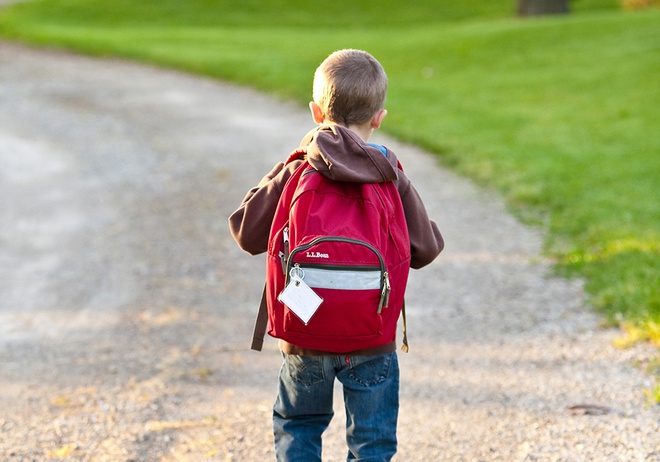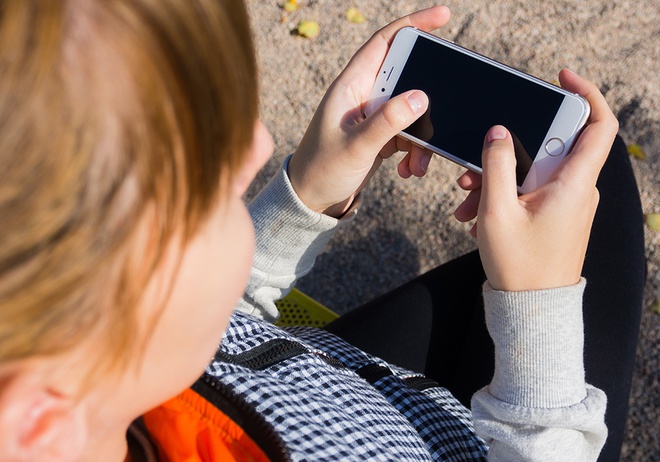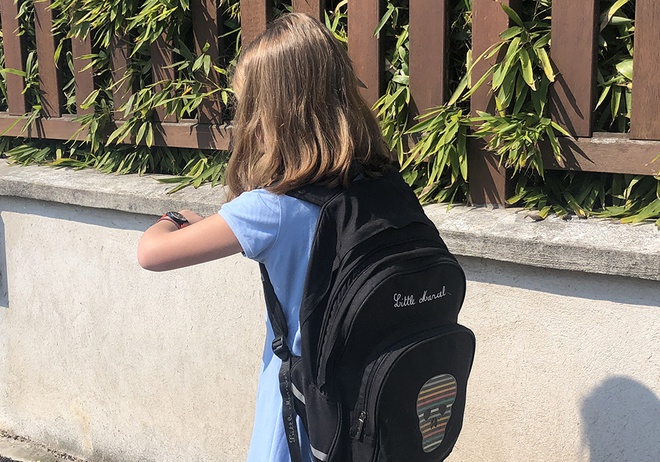Kids smart watch: How to decide?
It is essential to consider several criteria when choosing the most suitable geolocation tool for your kid. Here are some things to keep in mind before you decide to make your purchase.

Reading time : 14 min
Early adolescence marks the beginning of independence for most young people. No longer really kids, but not yet adolescents, they are nevertheless starting to make the same demands. In particular, they want to go out on their own, without an adult to accompany them. This period is as essential for kids between 8 and 12 years old as it is critical for their parents. For let's be honest, each parent is eager for their kid to become more independent, until they finally make the request. Parents' anxiety then becomes proportional to the number of requests for outings.
Initially, most parents do not conceive letting their kid go out alone on the street, whether it is to come home from school or to visit a friend. And those who do end up agreeing to it do so on the sole condition that they can know exactly where their kid is at all times. And if they can reach him, that's even better. So, at the first mention of a kid's independence, the purchase of a mobile phone or a kid's smart watch becomes an unavoidable subject. However, there is another attractive alternative: GPS tracker for kids. Here's an overview.
Summary of the article:
SUMMARY
Smartphone: more appealing to kids than to parents

The smartphone is often the first option contemplated by parents but above all by kids. And with good reason, it guarantees their independence, but above all, it represents for them the opportunity to finally have access to social networks. The obligation to answer parents' phone calls is ultimately a minor inconvenience when it comes to acquiring a mobile phone.
The ideal solution for kids
Pre-teens follow the latest trends. It is not uncommon for them to become trendsetters themselves. A smartphone allows them to make and receive calls, go on the Internet or watch videos and plenty of other things. Thus, they don't want to have a simple mobile phone.
The brand and model of the phone are essential. The smartphone has become a sign of wealth to which kids are attached. It sometimes gives them the illusion that they are on a higher social level than their parents. The mobile phone has indeed become a real fashion accessory like the latest sneakers or wireless apple headphones. They can socialise thanks to their smartphone. They don't want one from an unknown brand. It gives them a real sense of belonging.
On paper, the mobile phone is the ideal solution to reassure parents. Children can call parents to let them know they're home or send a text message to let them know they missed the bus. Similarly, parents can phone their kid to relieve their growing anxiety.
Smartphone tracking applications
In addition to being able to call and be called, there are mobile applications for smartphones, including the well-known Life 360. This mobile application aims to provide an accurate indication of the GPS position of the phone's holder. It is possible to define locations such as home or school. As soon as the kid leaves or arrives at a place, parents receive notifications. Although it works quite well, it does have its limits. The phone must necessarily be connected to the Wi-Fi network to send a location because most packages for children do not include 4G. Yet, during commutes between school and home, for example, the phone is not connected to any Wi-Fi network, yet it is at these times that kids are the most vulnerable. Thus, when the kid is at home, his or her phone is connected to the Wi-Fi network. But when he decides to go out, he is marked as being at home on the parents' application until the phone picks up a connection again and updates the new GPS position. The application will not show any notion of a route.
Moreover, this application has two main drawbacks. On the one hand, it is energy-consuming and contributes to reducing the battery, which is known to be the weakness of smartphones. On the other hand, if a phone is lost or stolen, the data is completely skewed. In one case, the lack of movement may worry parents unnecessarily, in the other, the location outside of the child's usual paths may frighten them.
What sounded like a good idea
Often taken out and used, the smartphone can be forgotten on the bus or fall out of a pocket on the way home. Unfortunately, it is rare to find back a lost phone and expensive to replace.
Theft of the smartphone can happen as well, especially if the model is in demand. Some children who do not have access to this type of object may want the phone and think about stealing it. In the same way, a mobile phone can attract ill-intentioned peers and be the source of extortion, with serious psychological consequences for a child.
Furthermore, even if the child has accepted to answer calls from parents, he or she will forget this requirement instantly once the phone is in his or her possession. Even if the kid agrees to answer the call, the excessive use of the phone often drains the battery quickly.
After all, the smartphone is much more than a mobile phone, and that's what ultimately causes the problem. This object, which was supposed to be a permanent link between parents and their child, often becomes a source of conflict. And for a good reason, with the smartphone in hand, the pre-teenager often neglects to do his homework. He usually favours the games and videos of his precious object.
Parents' disappointment
All in all, parents end up frustrated. The kid is always on his mobile phone, but they are not able to reach him. In the meantime, the kid is too busy chatting on Snapchat, watching videos on YouTube, posting photos on Instagram or making videos on TikTok.
Finally, parents often realise that the smartphone does not serve its primary purpose and that it is also a barrier to their kid's success at school. Some then choose to replace it with a simple mobile phone. The object is then often abandoned by the kid because it is unappealing. On the other hand, parents pay the cost of the telephone subscription throughout the commitment period with the telephone operator.
The kid's smart watch: a solution for kid's independence

In addition to the distraction that mobile phones cause, many schools have now banned them from their premises. Thus, the mobile phone does not seem to be the ideal solution. What other solutions are there for parents of kids who are afraid for their safety? Because of these restrictions, many parents are opting for the smart watch for kids.
Even if it does not have the appeal of a mobile phone, the kid's smartwatch is an option that may please a kid. This smart GPS watch is much more than just a gadget. Many models are available on the Internet, but it is essential to make a thorough comparison to find the best product. Caution, however, as some models of kids smartwatches work with iOS and Android phones, others only with Android smartphones.
What are the main features of a kid's smart watch?
Features must primarily satisfy the needs of parents. The GPS watch main advantage over the mobile phone is its size. Much smaller and more discrete than a smartphone, it fits on the wrist and is, therefore, not easy to lose.
Beyond that, the kid's tracker watch has attractive features for parents:
- GPS tracking is useful to locate the kid's GPS position in real-time with no distance limit.
- Parents can define safety zones (school, home). If the kid goes out of the zone, parents receive alerts to their smartphone via the application.
- The trip history allows parents to check their kid's trips over some time, usually up to 30 days.
- The SOS button is useful when the kid feels in danger. He must press the button for 3 seconds to alert parents.
- The anti-loss sensor is an alert that warns parents as soon as the kid takes off his watch.
- The call function allows both parents and children to call each other.
- The voice chat offers the kid the opportunity to talk with his relatives.
- The battery alert notifies parents when the battery is low.
- The class mode allows parents to set time slots which prohibits the use of the watch.
- Water-resistance: the water-resistant watch will not get damaged when the kid goes in puddles, but he will not be able to wear it to go to the swimming pool.
Other functions are offered depending on the model of the chosen GPS watch. Here are some of them:
- Listening to the environment function allows parents to listen to their kid's environment without him/her knowing it.
- The camera allows the kid to take pictures, but parents can also see what is around the kid from a distance.
- The torch allows the child to light up or read.
- The game function offers play activities or mathematical calculations.
The issue with Chinese products
There is a multitude of low-priced products on Amazon, between 20 and 50 pounds. These offers are tempting, but it is essential to bear in mind that the attractive price of these products is at the expense of low-quality materials. The associated application is very often underdeveloped and poorly functional.
Besides, the after-sales service is often insufficient, if not non-existent. In case of issues with the product, it is challenging to get in touch with the manufacturer. And given the price of the kids' smartwatch, it is likely that parents become discouraged and decide to buy another one.
Last but not least, data security sadly is a recurring issue. The risk of hacking and hijacking by a third party cannot be ruled out. Also, it is essential to remember that GPS watches collect a lot of sensitive data that may concern the kid. Based on this premise, it is paramount to check that the manufacturer has put in place a real data protection policy (CE standard), which is rarely the case for low-priced GPS watches.
High-quality GPS watches
As with all connected objects, it is a good idea to stay away from cheap products. Some products, fortunately, stand out from the crowd, such as the British-designed Xplora GPS watches, whose prices are around 149 pounds nonetheless. The British print guarantees a quality product. The associated services also seem to be on par. The GPS watch works with a free, intuitive application with many features that are updated very regularly to improve the service continuously.
The quality of the after-sales service is also an important aspect. An after-sales service platform operating in the territory excludes time difference issues and guarantees flawless availability in the event of any problems with the GPS watch or associated services.
Finally, the data protection policy of the GPS watch manufacturer must be a fundamental point of attention. Indeed, the manufacturer is the custodian of the security of the kid's data. Its GDPR (General Data Protection Regulation) practices must be in line with the recommendations of the ICO (Information Commissioner's Office) and ensure that sensitive information is stored on secure servers hosted in Europe to prevent any hacking. It is also essential to ensure the transparency of the manufacturer regarding the reuse of the data collected.
The various SIM cards available
Most watches work with SIM cards with or without a subscription. Parents are free to choose the solution they find most suitable and advantageous. For the kid's smart watch without a subscription, it is possible to buy a prepaid SIM card, which helps keep costs under control but offers relative freedom. In this case, it is essential to have an additional card paid in advance, because in case of omission, the watch is no longer useful. Caution, some smartwatches are not compatible with prepaid SIM cards.
However, it is possible for parents who already have a telephone package to insert a SIM card from the operator of their choice. The problem is that a SIM card from only one operator is likely to result in blank areas. It is, therefore, necessary to compare the zones covered by the operators to make a choice accordingly.
Finally, manufacturers often offer a monthly flat rate of around ten pounds. This subscription has a definite advantage because the SIM cards provided by the manufacturers are multi-operator. In other words, blank areas are almost non-existent since the operators take turns to ensure that connection to the network is always guaranteed. It may happen, for example, that certain rural or mountainous areas are less covered by one operator, in which case another operator will automatically take over. In other words, if the phone does not pick up the EE network, it will connect to the one of Vodafone, Three, O2 and so on. However, the monthly fee added to the initial price is a budget in itself. It's the price of peace of mind.
The disadvantages of kids' smart watches
The choice of a British-designed watch is imperative if you hope to use a high-quality product with adapted services while being reassured about data protection. But this represents a cost that is not insignificant that can be discouraging.
As battery life is proportional to their size, GPS watches have to recharge every day. A shortcoming which requires organisation and regularity so as not to risk the smartwatch going off when the kid has not yet returned home.
Furthermore, just like mobile phones, GPS watches may be prohibited in schools. It is therefore advisable to check the school's internal rules beforehand to ensure that this type of object is permitted. If the internal code of conduct does not specify this, it may be best to request authorisation from the school director.
The GPS watch can have a distracting effect in the classroom. The playful aspect of the watch can distract the student and his/her classmates. As can the possibility of calling or being called without limitation. For watches equipped with a class mode, children are perfectly able to change this setting from their parents' smartphone application. And it is even simpler if the configuration is doable from the watch.
The GPS watch can also be a source of conflict in the playground. An object of interest for many technology-savvy kids, it can, unfortunately, be a source of envy and be the cause of theft or extortion. Finally, if the watch has games, the kid may prefer to spend time playing rather than doing his homework on his way home from school.
What about GPS wristbands for kids?
Easier to use than a GPS watch, the GPS wristband for kids has no screen. It just has a chip and works with Bluetooth. It can be used without a SIM card and therefore without a subscription. The smart wristband is not expensive. It is possible to find one between 25 and 50 pounds approximately.
However, this device is not suitable for tracking a kid's route to school. It has a range of about 50 meters and does not offer any possibility of phone calls. It is therefore only useful for family outings in the forest or an amusement park, for example.
Things to check before buying a GPS
18 questions you need to ask yourself before buying a GPS tracker for your loved ones!
The kid's GPS tracker is a convenient alternative to the GPS watch

There is no need to pay a high price to keep an eye on your kid. When it comes to monitoring kids positions, another solution stands out from the crowd: the GPS tracker for kids. We're not going to lie to ourselves, the GPS tracker is less attractive than a GPS watch for kids, but it does have many advantages for parents.
Long disparaged, a child tracker is nevertheless a connected object that reassures both parents and kid when used wisely. It is not a question of reducing the kid's freedom, but of helping to give him or her more autonomy. Weenect offers an enticing alternative to smartphones and children's GPS watches: the Weenect Kids GPS tracker.
Focus on the GPS tracker
The GPS for kids is a small, discrete box without a screen, consisting of a GPS antenna, a GPS module and a GSM module including a SIM card. It has the notable advantage of not being a gadget likely to distract the child's attention either at school or on the way home. All other gimmicks disappeared for the sole benefit of geolocation and the child's safety.
At first glance, the GPS tracker is not the kid's first choice. However, the kid will agree when he understands that this little box is the guarantee of his newfound independence The GPS tracking device is, in fact, ideal for accompanying the kid until the beginning of his teenage years, as a transitional connected object.
GPS tracker features
The kid's GPS tracker works with a free smartphone application (iOS and Android). Furthermore, Weenect has patented a technology that allows the whole family, parents and grandparents, for example, to receive notifications and alerts at the same time. That is a way to avoid confusion, misinterpretation and save time.
Numerous features that serve the autonomy and safety of the child which are also functional for the parents.
- Real-time, unlimited distance tracking allows to precisely locate the child at a given time without any time lag.
- A zone exit detector sends alerts when entering or leaving predefined zones. Ideal for the first school trips without an adult, it is a useful tool to help children learn to be independent.
- A geolocation history that allows the kid's movements review afterwards to ensure that they do not endanger themselves by taking dangerous or too distant paths.
- An SOS button allows the kid to alert his parents if he feels he is in danger. An emergency telephone function is coupled to this device, allowing parents to judge the seriousness of the situation and reassure the kid. The call starts at the parents' initiative via the application (only in case of SOS, it is therefore impossible to "spy" on the child's environment).
- An application manages several trackers to preserve the safety and freedom of all the children in the family with a single account.
- A high-performance geolocation system in map, compass or radar mode makes it possible not to let the child wander away during family outings and to find him quickly if he gets lost.
- Long battery life of 7 days for daily use. A single recharge per week is sufficient compared to at least once a day for the child's connected watch or smartphone.
- An available and efficient after-sales service whose priority is to meet customer expectations as best as possible in the shortest possible time.
Benefits of the GPS tracker for kids
With no touch screen or even games to distract the child, the GPS tracker doesn't have the appeal of a GPS watch or a smartphone. That has the advantage of not distracting them from their school work. For the same reasons, it is not an object of envy and keeps the child safe from aggression, theft or mugging. Moreover, as the GPS tracking device is associated with an account, its theft does not represent any interest as it would be unusable by a third party.
Price is also a strong argument. It is not possible to find a smartphone for less than several hundred pounds. A high-quality smartwatch for kids costs around 150 pounds. Weenect offers an attractive price for its kid's GPS tracker at 49.90 pounds. Sold with an included multi-operator SIM card, coverage of the GSM network is almost 100%. That implies a subscription with or without commitment, the price of which is degressive depending on the duration.
Why choose a GPS tracker for your kid?
One significant downside of a kid's smart watch is their short battery life, which has to recharge daily. The kid's GPS tracker has a long battery life, which offers real comfort. Recharged during the weekend, for example, the kid GPS tracking device lasts up to 7 days. It is slipped into the school bag and remains there until the following weekend to recharge again.
The multi-network offered by the child GPS tracker via its SIM card is the guarantee that the GPS chip will always connect to the GSM network whatever the operator. So whatever the child's route, his parents know his exact position at all times.
Apart from all the features that may appeal to parents looking for an alternative to the smartphone or GPS watch, data protection is an aspect to take seriously. Weenect took this issue to heart to ensure that the privacy of families is respected.
Finally, schools do not ban the GPS tracker. It can stay in the pocket of the school bag. Therefore, it won't be a source of conflict in the playground or a distraction in the classroom.
Conclusion
Children's independence is both expected and feared by parents. The mobile phone is very often the first contemplated solution as it appears to be the best alternative. However, when parents use it, they realise that it mainly meets the kid's expectation, at the expense of his or her school results. As for the smart watch for kids, it is a safe and effective option, provided the parents pays attention to the functions it offers and the safety rules put in place in terms of data protection. But it has a cost that can be dissuasive.
Nevertheless, no need to give up on child safety, because that's what it's all about. The GPS tracker for kids seems to be a worthy alternative in terms of both location and reliability, and at a lower cost than competing options.
Are you looking for the best GPS tracker ?
18 questions you need to ask yourself before buying a GPS tracker
